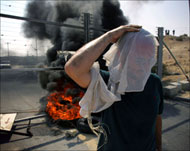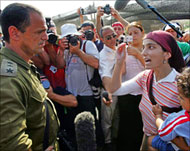Settlers defiant, Israeli army moves in
Defiant Jewish settlers have blocked the gates of Gaza’s most hardline settlements, preventing soldiers from delivering 48-hour eviction notices as Israel began its pullout from the coastal territory.

Troops were deterred by protesters on Monday in some enclaves but walked door-to-door in others, telling settlers to leave by Wednesday or face forcible eviction under Prime Minister Ariel Sharon’s plan to end Israel’s 38-year occupation of Gaza.
While many settlers vowed not to budge, a growing number took heed and started packing up and moving out.
Hundreds of settlers have signed state compensation deals to leave. Those who refuse to go could lose a third of the money, which ranges from $150,000 to $400,000 a family.
Settlers adamant
 |
|
Settlers burnt tyres at the gates |
Hundreds of settlers blocked the gates of Neve Dekalim, Gaza’s largest settlement, to prevent Israeli forces from entering.
Dozens of observant Jewish men, wearing white prayer shawls, held morning prayers at the gate, appealing for divine intervention to block the withdrawal.
A crowd of youths wearing orange, the colour of defiance, sat on the streets and screamed at the soldiers.
“You’re a partner to a crime,” screamed one protester.
Human chains
Troops moved into the community through a second entrance, only to be blocked by crowds who burned tyres and formed human chains.
When a small group of soldiers managed to enter, settlers took the eviction notices and burned them.
One police officer was covered in green paint thrown by protesters.
Aljazeera has learned that Israeli troops have clashed with Jewish settlers who refused to evacuate their settlements in the West Bank.
 |
|
The withdrawal operation began |
Clashes broke out at Shafi Shamron along the road leading to the Homish settlement, which is among four in the West Bank intended for evacuation in the disengagement plan.
Despite the standoff in Gaza, there were signs that residents would leave before the deadline. A convoy of moving trucks drove in through the main gate.
The pullout got under way after months of political wrangling and mass protests.
The complex operation began at midnight on Sunday (2100 GMT) when soldiers lowered a road barrier at the Kissufim Crossing, signalling that it had become illegal for Israelis to be in Gaza.
As the barrier went down, a traffic light changed from green to red.
Thousands remain
Under the pullout plan, Israel will remove all 21 Jewish settlements from the Gaza Strip and four enclaves in the West Bank.
 |
|
Among the settlers are those |
While many of Gaza’s 8500 residents have left, the army estimates that several thousand people remain, including extremists who infiltrated Gaza.
Settler leaders have promised to resist without resorting to violence, though security officials fear extremists might violate that pledge.
The withdrawal is the first time Israel would dismantle settlements in areas captured in the 1967 Middle East war and claimed by the Palestinians for their future state.
Security
Prime Minister Ariel Sharon believes the withdrawal will improve Israeli security by reducing friction with the Palestinians.
He was due to address the nation at 8pm (1700 GMT) on Monday.
 |
|
Sharon is under attack from |
“It’s a painful and difficult day, but it’s a historic day,” Israel’s defence minister, Shaul Mofaz, told Army Radio.
Israel’s cabinet also on Monday gave final approval to quit Gush Katif, the largest Gaza settler bloc, a vote seen as a formality.
At the small settlement of Netzer Hazani, resident Anita Tucker said only one of the 70 families had left and 17 others would leave on Monday.
The others would resist without violence, she said.
Speaking before the soldiers came with the eviction orders, Tucker, 59, originally from Brooklyn, New York, said hundreds of people came to reinforce the settlement.
“We know we can’t fight the Israeli army. We don’t want to,” she said. “We are the Israeli army.”
Palestinian police deploy
Thousands of Palestinian police moved into positions near Jewish settlements to keep away Palestinian crowds and prevent attacks during the pullout, something that Israel warned would bring harsh retaliation.
 |
|
Palestinian security moved into |
Palestinian residents watched settlers packing up, and seeing moving trucks leave settlements dispelled the skepticism many Palestinians felt until the last minute.
“They are actually leaving. Who would have ever thought?” said Palestinian farmer Ziyad Satari, 40, standing on the roof of his three-story home in the Palestinian town of Khan Yunus, which overlooks the Morag settlement.
Hundreds of supporters of the Islamic Jihad resistance group celebrated in Gaza City on Sunday, with men firing guns in the air, and teens setting off fire crackers and distributing sweets.
Hamas organised special midnight prayers of thanks at Gaza mosques.
Reassurance
Palestinian Authority President Mahmoud Abbas offered the Israelis reassurance.
“We tell the Israeli people, ‘You have chosen the right path,”‘ he told Channel 10 TV.
 |
|
Mahmoud Abbas says the |
“Don’t listen to the voices of the extremists who want a continuation of the occupation. I don’t want – and I will not accept – any clashes with the army or the settlers.”
However, there were exchanges of fire early on Monday between soldiers and Palestinians near the Kfar Darom settlement, and mortar shells fell in two settlements and near an army base.
No casualties were reported.
Many hope the pullout from the territory Israel captured in 1967 will be the start of a true partition of historic Palestine between Arab and Jew.
Others fear it is a ploy by Sharon to get rid of areas he does not consider crucial to Israel while consolidating control of parts of the West Bank, where the vast majority of the 240,000 Jewish settlers live.
The World Court describes Israeli settlements as illegal. Israel disputes this.
Israel intends to leave the Gaza settlements and four West Bank enclaves by 4 September. It plans to complete the Gaza pullout in October when the last troops come out.